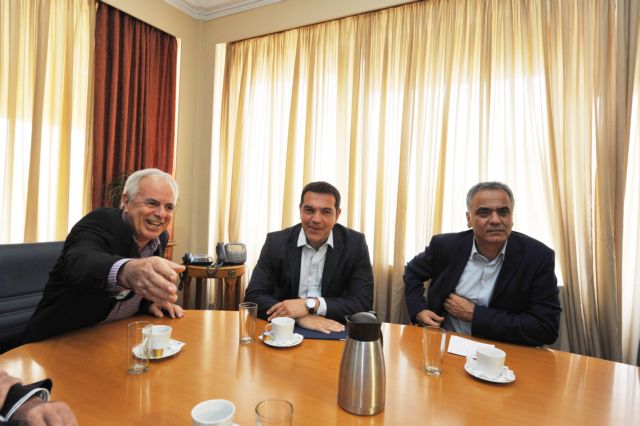The Prime Minister Alexis Tsipras visited the Ministry of Agricultural Development on Wednesday, in order to discuss the strategic development of productive reconstruction in the rural economy.
In the speech he delivered after his meeting with Alternate Minister Evangelos Apostolou and Deputy Minister Panagiotis Sgouridis, Mr. Tsipras noted that his government’s intention is to offset the effect of the austerity measures with countermeasures, in an effort to support farmers.
Mr. Tsipras argued that “we much create roads ever where there are none and do everything possible to crate the conditions of social justice, so that all social groups may secure their incomes”, which he added would occur be a redistribution of income. He further noted that “you cannot pay off loans without growth” and underlined the need to reach an agreement.
Furthermore the Prime Minister stressed that “the agricultural sector is a key pillar in the restoration of the Greek economy and the new model” but added that his cabinet is “forced” to implement policies not of their choosing. Mr. Tsipras explained that he will request a better deal for farmers from the institutions, as he wants to “keep farmers in their fields”.
During his speech he revealed that the income of farmers has dropped 30% more than that in other sectors and pointed out that Greek produce is more expensive that imports on the super market shelves in Central Europe and vowed to combat the financial interests that have created monopolies in agriculture.
Farmers in Northern Greece preparing for strike actions
Meanwhile, farmers and ranchers in Northern Greece are preparing to mobilize in response to the hard austerity measures that will come into effect. The nationwide association of ranchers has organized a demonstration outside the Ministry of Macedonia-Thrace for the 25th of August and has called for mass participation from the agricultural sector.
Many farmers affected by the new measures wish to take to the streets of Athens and demonstrate outside the Ministry of Agricultural Development, however a significant section of them are in favor of keeping a lower profile. Although the majority of farmers are not against being taxed, they argue that “some minor changes” are needed in order to survive.
Amongst the changes which they are after is the abolition of the imputed income, introducing a tax-free threshold of 7,000 to 8,000 euros and maintaining OGA pensions and contributions at current levels, so that producers are not forced to pay more.



